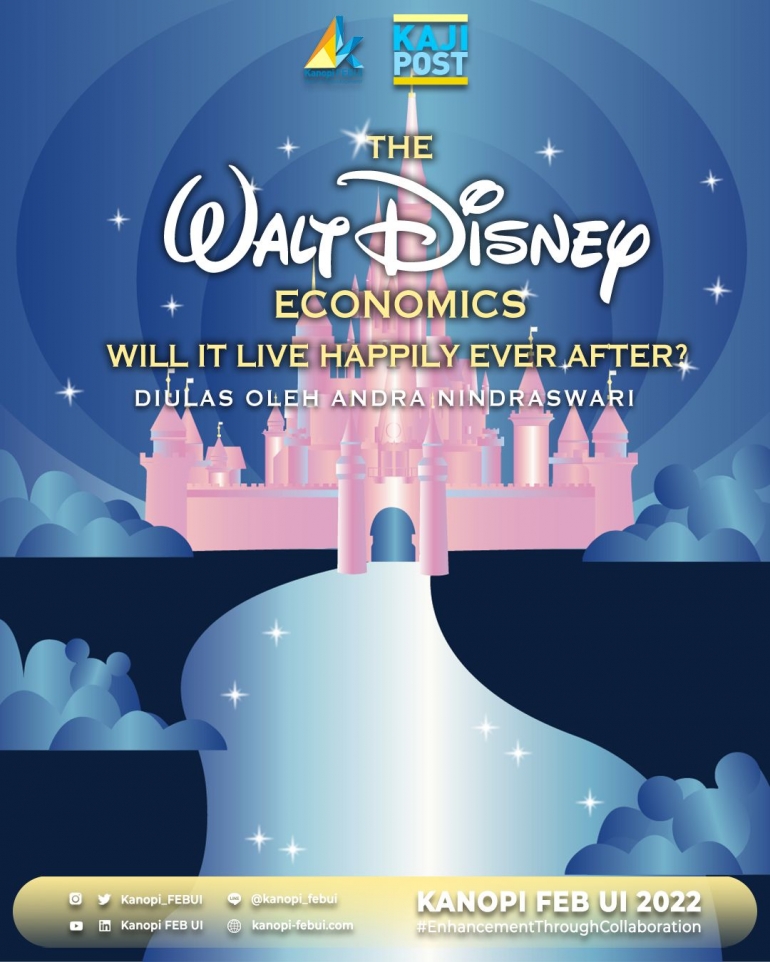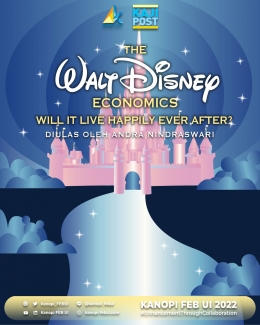By virtue of Walt Disney's unsurpassed imagination and determination, Disney has now become a global empire. The company was able to go from a moderately successful animation studio to a complete entertainment with theme parks, endless merchandising, and a catalog of masterpieces. From classic stories to immersive experiences, Disney has created a magical world that people of all ages will cherish for a lifetime.
Media entertainment and theme parks have been Disney's major sources of revenue and success. Even with the pandemic, its streaming services have kept many people occupied and entertained at home.
With the continued rise in subscribers for the streaming service, Disney believes that streaming will also be an important facet of the company's media business. Disney's streaming service, Disney+, is facing some real competition against a large number of competitors including Netflix, Amazon Prime, and HBO Max.
On the other side, as Disney theme parks are striving to recover from their billions of dollars loss in operating revenues due to the coronavirus outbreak, reopening their parks will most likely result in higher operating and marketing spending as well, which poses the risk of a decline in the company's net income if it's not anticipated.
As written in the last sentence of most of their story endings, will Disney itself live happily ever after?
The Making of an Empire
Once upon a time, a Missouri farm boy who was determined to be an artist decided to make a cartoon in Kansas City about a little girl in a cartoon world, called Alice's Wonderland. Not long after that, a distributor in New York, M. J. Winkler, made a contract to distribute the series from his "pilot" film on October 16, 1923, which marks this date as the start of the Walt Disney company.
While the cartoons were gaining popularity in movie houses, the team saw ways for Disney to maximize its assets through merchandising and launching its own cable network, the famous Disney Channel. As his motion pictures and television programs became successful, he felt a desire to branch out into an amusement park where both parents and children could enjoy themselves. This was the origin of Disneyland, strengthening the family entertainment concept.
Several major additions were later made to optimize its assets once again. Starting with the acquisition of 21th Century Fox and then the remarkable launch of its streaming service, Disney+, which together with ESPN+, Hulu, and Disney+ Hotstar, delivers the company's iconic brands and compelling stories directly to consumers.
How Disney is Making Money and Expanding Its Business
If we look at Disney's latest annual report, the company generated a global revenue of 67.41 billion U.S. dollars in 2021. The company's biggest segment was its media and entertainment segment, which generated revenue of 50.87 billion U.S. dollars. How can it possibly not be their main source of revenue? Disney is famed for its authenticity, enchanting emotions through its storytelling. Their films and characters have a soft spot in most of our hearts.
Aside from producing its own films, Disney acquires significant media companies to further consolidate its market share leadership in the Media and Entertainment industry. Disney is committed to family entertainment so that everyone in the family would have something suitable for them.
This is demonstrated by Disney's ESPN buyout through its acquisition of Capital Cities/ABC. Under the cable sports networks industry, ESPN is one of the biggest drivers in both revenue and operating income for Disney today, causing Disney to hold a dominant market position across these TV network categories.
Walt Disney Theatrical Market Charts have also shown that out of the Top 10 Grossing Walt Disney Movies from 1995-2022 (adjusted for inflation) four of them are from Marvel superhero stories, three from Star Wars (Lucasfilm), and one from The Incredibles (Pixar), making only two movies from Disney's original production which are Finding Dory and Pirates of the Caribbean - Deadman's Chest.
Furthermore, Disney's acquisition of 21st Century Fox allows them to grow its content ecosystem with popular titles such as Deadpool and Avatar. Acquiring these companies turned out to be a great idea after all. Disney's market leadership now extends beyond TV networks into movie theaters, theme parks and the current trend, video streaming (Disney+).
Disney's Involvement in the Streaming Wars: Is It A Zero-sum Game in the Industry?
Other than Disney Plus, companies such as Netflix have also seen a video consumption increase throughout the pandemic. There is a situation in game theory called the "Zero-sum" game in which one person's gain is equivalent to another's loss. Netflix reported that it lost 200,000 of its subscribers in the first quarter of 2022. Does this necessarily imply that their "wealth" is indirectly being transferred to other streaming services, such as Disney+, that are more appealing?
Netflix is losing its subscribers for a reason they can't control: the competition in the streaming arena that has got intense. Basic economic theory demonstrates that when firms have to compete for customers, their strategy can be a form of lowering prices, maintaining quality, or providing a greater variety of options. Disney+ clearly wins the streaming wars price competition.
It has a subscription plan of $7.99 per month with an offer of $13.99 a month for the Disney Bundle that includes Hulu and ESPN+ while Netflix's basic subscription costs $9.99 per month with one stream at a time, offers $15.49 per month for two simultaneous streams, and $19.99 per month with four simultaneous streams.
While Disney+ is enjoying its ride along in the back of Marvel Studios and Star Wars shows, some of the qualitative reviews on the internet show an indication that Netflix is also lacking in enticing originals and big franchises.
The Walt Disney Company reported that Disney+ had 137.7 million subscribers worldwide as of its second quarter of 2022. Since the start of the fiscal year in 2020, the services' subscribers base has grown by more than 100 million. The restrictions on theater openings and capacity due to the pandemic has accelerated growth in Disney+ subscribers.
Films such as Luca turned out to be one of the top streamed films in 2021. This success leads to other Pixar movies like Turning Red to head directly into Disney+. Hence, there can be no causation between Disney+ continued rise in subscription and Netflix's declining subscribers.
For now, it's safe to say that the numbers of Disney+ subscribers are still on the rise, and to ensure the numbers keep on rising, Disney has to consistently produce and distribute high quality films.
So, is the streaming war a zero sum-game theory? Not exactly. There could be not just one winner of the ongoing streaming wars. In the new paradigm of content delivery, they are able to coexist.
That's where branding and economies of scale come into play. In game theory, there's also a "Non-zero-sum" game where one decision maker's gain does not necessarily result in the other decision makers' loss and vice versa, which shows the possibility of a win-win game. If we think of the internet video as an ecosystem, then the more players there are in internet video, the bigger that ecosystem gets.
Ensuring A Happily Ever After in the Long Term
Disney is currently facing inflation that isn't purely macroeconomic, but is related to an increase in wage pressure and costs related to new projects. Over the years, Disney is known to have a high pricing power which helps them adapt to inflation.
To put it in economic terms, a company can achieve pricing power in several different ways, such as selling goods and services that are vital to customers, giving them no option but to pay up or having strong loyalty from customers.
However, while Disney's revenues from its direct-to-consumer sales increased by 23% to $4.9 billion in the second quarter of 2022, their operating loss increased by $0.6 billion to $0.9 billion as a result of greater programming and production, marketing, and technology costs that were partially offset by higher subscription revenue.
Disney Parks, Experiences and Products revenues surged to $6.7 billion in the second quarter of 2022, up from $3.2 billion in the prior-year quarter. As Disney parks reopen, Disney's operating income was partially offset by higher costs of operating.
Overall, Disney's operating margin was still below pre-Covid levels. This leads to a new question that needs to be resolved: as their businesses are getting back to operating at near full capacity, will the company be able to maintain its profitability in the changing market?
Other than having to deal with the increasing costs, Disney's stock price has fallen over the past year from around $170 per share to $103 today. This can be explained by investors' hesitation on the streaming industry, which is also provoked by Netflix performances where they lost 200,000 of its subscribers in the first quarter of the year, and the cultural war in Walt Disney World Florida that resulted in the removal of its special tax status.
Despite its track record as one of the largest media conglomerates in the world, and is perhaps best known for their massive library of movies and shows - pioneer of cartoon films, investors are concerned that their abundance of content may not be enough to overcome the slowing growth in its traditional broadcast and TV cable.
If Disney is able to gain investors' trust and improve their performance by constantly updating their competitive strategy in the long term, then they will most likely continue to live happily ever after.
---------------------------------------------------
Bibliography
Wasko, J. (2020). Understanding disney: The manufacture of Fantasy. Polity Press.
Disney history. D23. (2021, November 8). Retrieved May 20, 2022, from https://d23.com/disney-history/
Erprose. (2021, November 11). Disney's magical pricing power can't outpace inflation right now. CNBC. Retrieved May 20, 2022, from https://www.cnbc.com/2021/11/11/disneys-magical-pricing-power-cant-out-ride-inflation-right-now.html
Smith, P. B. C. (2022, February 24). Important Disney acquisitions over time: Disney History. Disney News. Retrieved May 20, 2022, from https://disneynews.us/important-disney-acquisitions-time-disney-history/
All time worldwide box office for Walt Disney Movies. The Numbers. (n.d.). Retrieved May 20, 2022, from https://www.the-numbers.com/box-office-records/worldwide/all-movies/theatrical-distributors/walt-disney
NBCUniversal News Group. (2022, April 19). Netflix says it lost 200,000 subscribers in first part of the year. NBCNews.com. Retrieved May 20, 2022, from https://www.nbcnews.com/business/consumer/netflix-loses-200000-subscribers-first-time-in-10-years-rcna25074
Yahoo! (2022, May 20). The Walt Disney Company (DIS) stock price, news, Quote & History. Yahoo! Finance. Retrieved May 20, 2022, from https://finance.yahoo.com/quote/DIS/
Follow Instagram @kompasianacom juga Tiktok @kompasiana biar nggak ketinggalan event seru komunitas dan tips dapat cuan dari Kompasiana
Baca juga cerita inspiratif langsung dari smartphone kamu dengan bergabung di WhatsApp Channel Kompasiana di SINI







